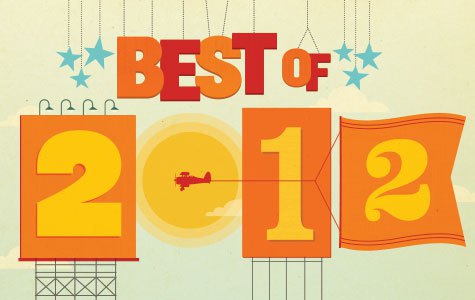
 PART ONE PART TWO
PART ONE PART TWO
PART THREE
When I heard that the Grammy Awards show sent out advisories about what to wear on national TV, I chuckled, realizing nobody has to worry about that with the Hearts & Minds annual BEST BOOKS AWARDS. You can read this third installment, or the honored books themselves, even, in your PJs. In fact, some of them may have been written by authors in PJs, a fact most likely not mentioned in the Best of the Year lists in The New York Times or Atlantic Monthly. So, get comfortable, we’ve got some more honorable mentioning to do.
BEST BOOK ABOUT FAITH, DOUBT, LEARNING TO BE REAL
N eighbors and Wise Men: Sacred Encounters in a Portland Pub and Other Unexpected Places Tony Kriz (Nelson) $15.99 I’m sure someone somewhere is complaining that a religious publisher wrote a book about a bar. Yeah, they call it a pub on the cover, but let me warn you, it ain’t no Eagle and the Child. Well, the bigger matter is whether religious publishers should publish stories of guys kicked out of missionary organizations for inadequate faith, who happened to find insight from Muslim friends on said mission field, who learns as much from the blue collar bar flies back home where he goes to study than from the seminary classes he’s taking in a nicer part of town, and whether this low-key, open-minded, less than confident faith journey is somehow helpful to read about. It is a risk, I know. And, we believe, it is exactly the sort of book that is, in fact, helpful. It is real and it is in many ways beautiful. It is good and truthful. So we love this book.
eighbors and Wise Men: Sacred Encounters in a Portland Pub and Other Unexpected Places Tony Kriz (Nelson) $15.99 I’m sure someone somewhere is complaining that a religious publisher wrote a book about a bar. Yeah, they call it a pub on the cover, but let me warn you, it ain’t no Eagle and the Child. Well, the bigger matter is whether religious publishers should publish stories of guys kicked out of missionary organizations for inadequate faith, who happened to find insight from Muslim friends on said mission field, who learns as much from the blue collar bar flies back home where he goes to study than from the seminary classes he’s taking in a nicer part of town, and whether this low-key, open-minded, less than confident faith journey is somehow helpful to read about. It is a risk, I know. And, we believe, it is exactly the sort of book that is, in fact, helpful. It is real and it is in many ways beautiful. It is good and truthful. So we love this book.
You may know this author from his appearance at Reed College in the best-selling Donald Miller book, Blue Like Jazz; yes, he is that Tony, Tony the Beat Poet. Some of that story, he and Donald being at Reed, is here told from Tony’s view. And what a story he tells, of his own drifting from evangelical over-confidence to a new found solidarity with outsiders, those perhaps hostile to organized religion, those who — and this is the moral of the story — have much to teach us, not only about life, but about God and Christian grace. In this book, non-Christians encouraged the extraordinary Kriz to “fall toward Christ” and we are glad. It is a splendid memoir, enjoyable, at times heartbreaking, and a revealing, even wise story. If we had real trophies, we’d give him one, for sure. Or at least offer him a beer in congratulations.
BEST BOOK ABOUT FAITH, DOUBT, LEARNING TO BE REAL – RUNNER UP
F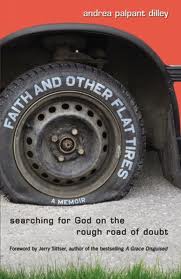 aith and Other Flat Tires: Searching for God on the Rough Road of Doubt Andrea Palpant Diley (Zondervan) $14.99 Again, this is a memoir, honestly rendered, well-told, full of youthful angst and struggle, sharing a hard journey away from a well-intended, conservative evangelicalism towards a more global vision, engaged, open. I so, so loved this as it quite wonderfully captured the feelings and faith journey of many young adults I know and admire. Diley was raised in a good Christian home, grew up listening to Christian rock music, safe, healthy, fine. In college, she realized there was a larger world out there, so to speak, and developed friendship with bohemians, artists, poets, fascinating non-Christian young adults in town. She grew disenchanted with her traditional church, even the drifting from her Christian college fellowship. Of course, she’s listening to emo rock, insisting she was still a Christian, but increasingly distant from the moral center of her family, church and Christian college. There is an influential African mission trip that introduces her to profound suffering, nearly pushing her over the edge, feeling such sorrow with our broken world. This is amazing stuff, really, and she is brave to write about it, to own it. It makes for a great read; compelling, even. Throughout there is a wonderful mentor and friend in her life — a long-time family friend who is also her college professor, the exquisite and mature writer, Gerry Sittser (who wrote his own memoir of tragedy, A Grace Disguised which figures into Diley’s story a bit.) Sittser writes a lovely forward to this memoir. I have written about this unsung book before, suggesting it is very helpful for anyone wanting a glimpse into the window of a maturing young adult, who comes to own her own honest faith, doubts and all, as she struggles with making sense of the world as she comes to understand it. Wonderful.
aith and Other Flat Tires: Searching for God on the Rough Road of Doubt Andrea Palpant Diley (Zondervan) $14.99 Again, this is a memoir, honestly rendered, well-told, full of youthful angst and struggle, sharing a hard journey away from a well-intended, conservative evangelicalism towards a more global vision, engaged, open. I so, so loved this as it quite wonderfully captured the feelings and faith journey of many young adults I know and admire. Diley was raised in a good Christian home, grew up listening to Christian rock music, safe, healthy, fine. In college, she realized there was a larger world out there, so to speak, and developed friendship with bohemians, artists, poets, fascinating non-Christian young adults in town. She grew disenchanted with her traditional church, even the drifting from her Christian college fellowship. Of course, she’s listening to emo rock, insisting she was still a Christian, but increasingly distant from the moral center of her family, church and Christian college. There is an influential African mission trip that introduces her to profound suffering, nearly pushing her over the edge, feeling such sorrow with our broken world. This is amazing stuff, really, and she is brave to write about it, to own it. It makes for a great read; compelling, even. Throughout there is a wonderful mentor and friend in her life — a long-time family friend who is also her college professor, the exquisite and mature writer, Gerry Sittser (who wrote his own memoir of tragedy, A Grace Disguised which figures into Diley’s story a bit.) Sittser writes a lovely forward to this memoir. I have written about this unsung book before, suggesting it is very helpful for anyone wanting a glimpse into the window of a maturing young adult, who comes to own her own honest faith, doubts and all, as she struggles with making sense of the world as she comes to understand it. Wonderful.
BEST BOOK ON COMMUNITY — A “CAN YOUR CHURCH DO THIS?” AWARD
L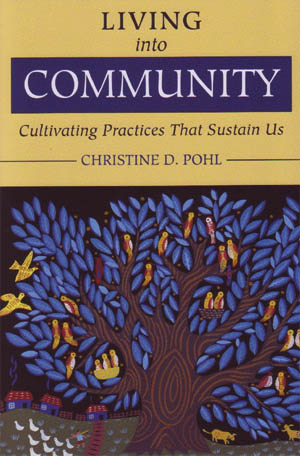 iving Into Community: Cultivating Practices That Sustain Us Christine D. Pohl (Eerdmans) $20.00 Decades ago when we were starting an intentional house-holding community in Pittsburgh –“living together in a world falling apart” we sometimes said — we longed for books on what this meant. We were not a house church, nor a commune, but we wanted a quality of life inspired by the unity and community of the early church, sharing meals and doing life together. As we searched for books to guide us we discovered Community and Growth by Jean Vanier, a true classic, and Life Together by Bonhoeffer, of course, but there wasn’t much else. Other books have come out since (including a truly stellar resource that arrived late this year, Christian Community Handbook by David Jansen, published by Paraclete Press; $19.99) but there still hasn’t been, until now, just a really great book on community that isn’t about communes. This one is the one we’ve been waiting for — dare I say, waiting 35 years for! It surely deserves an award or two this year!
iving Into Community: Cultivating Practices That Sustain Us Christine D. Pohl (Eerdmans) $20.00 Decades ago when we were starting an intentional house-holding community in Pittsburgh –“living together in a world falling apart” we sometimes said — we longed for books on what this meant. We were not a house church, nor a commune, but we wanted a quality of life inspired by the unity and community of the early church, sharing meals and doing life together. As we searched for books to guide us we discovered Community and Growth by Jean Vanier, a true classic, and Life Together by Bonhoeffer, of course, but there wasn’t much else. Other books have come out since (including a truly stellar resource that arrived late this year, Christian Community Handbook by David Jansen, published by Paraclete Press; $19.99) but there still hasn’t been, until now, just a really great book on community that isn’t about communes. This one is the one we’ve been waiting for — dare I say, waiting 35 years for! It surely deserves an award or two this year!
You most likely know Ms Pohl, who teaches at Asbury Theological Seminary in Kentucky, for her amazingly important, seminal work on hospitality called Making Room (Eerdmans; $20.00.) That one literally put the topic of hospitality on the map in the wider world of religious publishing and congregational practice and remains one of the top few books on having an open heart and open home, creating an inviting, gracious faith community; it is a true must- read! That she writes now about building practices into our congregations that nurture and sustain authentic, deeper relationships makes sense, and Living Into Community is in many ways a perfect sequel to Making Room. I hope you know that your church needs this book.
There are rave endorsements on the back — from David Gushee who says it is “a truly beautiful book” and from Marva Dawn who says “every Christian should read this provocative book!” There are, as she says “interlocking relationships and
dangerous deformities of practices that could deepen our communities but often destroy them.” This is a great book to read for anyone who wants more out of church membership, anyone who has a small group that longs to be a bit deeper in being a caring group, and, certainly, anyone who fancies themselves interested in intentional house holds. I am sure you know, as I do, that most churches and fellowship groups are polite, caring, but tainted with shallowness, even sometimes jealousy, gossip, manipulation, exclusion. We are not good at making and keeping promises, not good at “speaking the truth in love” and sometimes not good at exhibiting the unity Christ calls us to. This book is brilliant, detailed, honest, and very, very important. Surely one of the very best books of the year; one of the very best books in a very long time. It was, by the way, named the Book of the Year by our friends at The Englewood Review of Books. Congratulations!
BEST TEXTBOOK ABOUT THE MISSION OF THE CHURCH
Center Church: Doing Balanced Gospel-Centered Ministry in Your City Timothy Kelle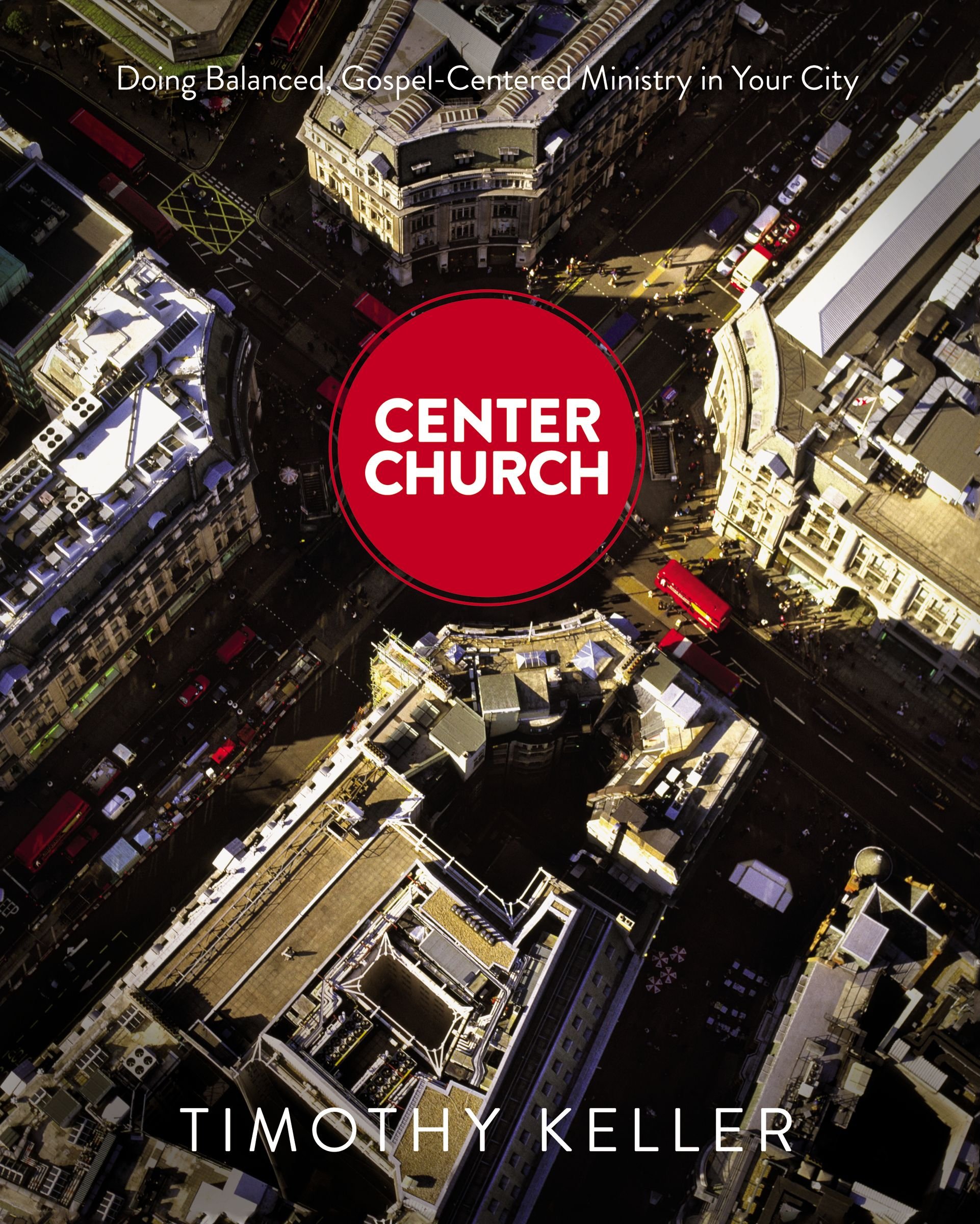 r (Zondervan) $29.99 This big, serious book deserves a longer review, but it is surely the best book of its kind that I have ever seen! Designed to be thoughtful and thorough, but readily useable for church planters in the Redeemer City to City network, this includes not only helpful, good material on the nature of the mission of the church — well written, vigorous and engaging, but fairly standard stuff — it also includes extraordinary content about engaging culture, about working as agents of social transformation, about the relationship of common grace and human flourishing within the third places and local institutions where the church is planted. It has a wonderfully gospel-centered foundation, trusting in God’s saving grace and providence, but it also has a missional edge, insisting on the full proclamation of God’s Kingdom reign. Agree or not with every detail, this is a spectacular book, handsomely produced, one I wish would be in the hands of every pastor and their supportive leadership boards or councils. It includes good information that would supplement even the best seminary courses and, frankly, offer a solid introduction for those whose seminary neglected to offer this sort of very important teaching about doing ministry. Whether your church is newer or older, whether it is urban or not, this is going to be helpful. Very highly recommended, very earnestly awarded.
r (Zondervan) $29.99 This big, serious book deserves a longer review, but it is surely the best book of its kind that I have ever seen! Designed to be thoughtful and thorough, but readily useable for church planters in the Redeemer City to City network, this includes not only helpful, good material on the nature of the mission of the church — well written, vigorous and engaging, but fairly standard stuff — it also includes extraordinary content about engaging culture, about working as agents of social transformation, about the relationship of common grace and human flourishing within the third places and local institutions where the church is planted. It has a wonderfully gospel-centered foundation, trusting in God’s saving grace and providence, but it also has a missional edge, insisting on the full proclamation of God’s Kingdom reign. Agree or not with every detail, this is a spectacular book, handsomely produced, one I wish would be in the hands of every pastor and their supportive leadership boards or councils. It includes good information that would supplement even the best seminary courses and, frankly, offer a solid introduction for those whose seminary neglected to offer this sort of very important teaching about doing ministry. Whether your church is newer or older, whether it is urban or not, this is going to be helpful. Very highly recommended, very earnestly awarded.
BEST NEW BOOK BASED ON PREVIOUS WORK (TIE)
D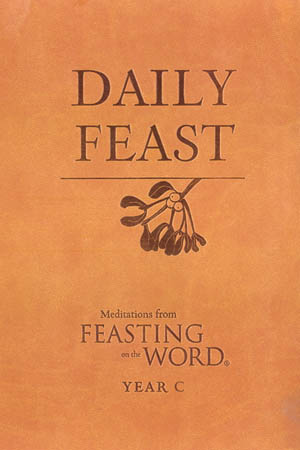 aily Feast: Meditations from Feasting on the Word Year C edited by Kathleen Long Bostrom & Elizabeth Caldwell (Westminster/John Knox) $25.00 You know how the Academy Awards honor a film that was created based on another medium, a previous book, say? This award is like that — a true and significant honor, bestowed for a genius idea, really, a devotional based on the popular and previously published best-selling WJK Feasting on the Word preaching commentaries. You know we carry all four of those big books for each liturgical cycle, and think highly of them. This faux leather devotional draws some of the most succinct or inspiring paragraphs from the lectionary commentary in Feasting for the passages for any given week, adding in a few things to ponder or write about in a journal, and offering a nicely worded closing prayer. So, some of this is new, but the main reading is drawn from those bigger, bulkier volumes. This comes with a lovely ribbon marker, making it a great devotional that allows one’s devotional life to be informed by mainline, ecumenical insights about the lectionary texts. Good for anyone, this is an especially useful tool for pastors who should be marinating themselves in the Word upon which they will be preaching that week. What a great idea!
aily Feast: Meditations from Feasting on the Word Year C edited by Kathleen Long Bostrom & Elizabeth Caldwell (Westminster/John Knox) $25.00 You know how the Academy Awards honor a film that was created based on another medium, a previous book, say? This award is like that — a true and significant honor, bestowed for a genius idea, really, a devotional based on the popular and previously published best-selling WJK Feasting on the Word preaching commentaries. You know we carry all four of those big books for each liturgical cycle, and think highly of them. This faux leather devotional draws some of the most succinct or inspiring paragraphs from the lectionary commentary in Feasting for the passages for any given week, adding in a few things to ponder or write about in a journal, and offering a nicely worded closing prayer. So, some of this is new, but the main reading is drawn from those bigger, bulkier volumes. This comes with a lovely ribbon marker, making it a great devotional that allows one’s devotional life to be informed by mainline, ecumenical insights about the lectionary texts. Good for anyone, this is an especially useful tool for pastors who should be marinating themselves in the Word upon which they will be preaching that week. What a great idea!
BEST NEW BOOK BASED ON A PREVIOUS WORK (TIE)
F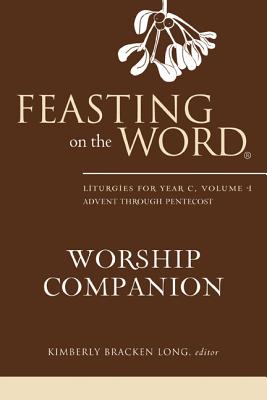 easting on the Word: Liturgies for Year C Volume 1 (Advent Through Pentecost) Worship Companion edited by Kimberly Bracken Long (Westminster/John Knox) $35.00 You saw our note above, about the Academy Awards given to films which draw on a previous medium. This really is like that, and we honor it as a lectionary-based worship resource based on the previously published preaching commentaries known as Feasting on the Word. This draws from them and serves as companions to them. There are Opening Words or Call to Worships, Call to Confessions and Prayers of Confessions and Declarations of Forgiveness. There are prayers of the day, prayers for illumination, prayers of intercessions, etcetera. There is for each Sunday a set of questions to ponder (wisely used by the liturgist before the service, but also would be good for congregational reflection. There is a morning and evening “household prayer” which can be copied, so that congregants can use them throughout the week. A good CD ROM comes with the book as well, ideal for copying these prayers into bulletins and such. Like it’s namesake (which was edited by Barbara Brown Taylor) this prayer book is ecumenical in perspective, and uses inclusive language, of course. There will be a second volume for the second half of Year C published later in 2013.
easting on the Word: Liturgies for Year C Volume 1 (Advent Through Pentecost) Worship Companion edited by Kimberly Bracken Long (Westminster/John Knox) $35.00 You saw our note above, about the Academy Awards given to films which draw on a previous medium. This really is like that, and we honor it as a lectionary-based worship resource based on the previously published preaching commentaries known as Feasting on the Word. This draws from them and serves as companions to them. There are Opening Words or Call to Worships, Call to Confessions and Prayers of Confessions and Declarations of Forgiveness. There are prayers of the day, prayers for illumination, prayers of intercessions, etcetera. There is for each Sunday a set of questions to ponder (wisely used by the liturgist before the service, but also would be good for congregational reflection. There is a morning and evening “household prayer” which can be copied, so that congregants can use them throughout the week. A good CD ROM comes with the book as well, ideal for copying these prayers into bulletins and such. Like it’s namesake (which was edited by Barbara Brown Taylor) this prayer book is ecumenical in perspective, and uses inclusive language, of course. There will be a second volume for the second half of Year C published later in 2013.
BEST NEW SERIES OF BOOKS — A TRIFECTA AWARD FOR THREE 2012 TITLES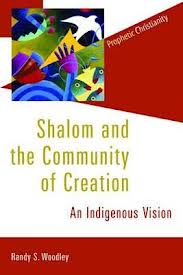 P
P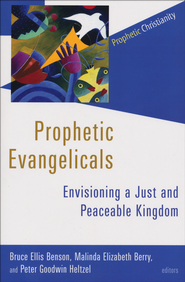 rophetic Evangelicals: Envisioning a Just and Peaceable
rophetic Evangelicals: Envisioning a Just and Peaceable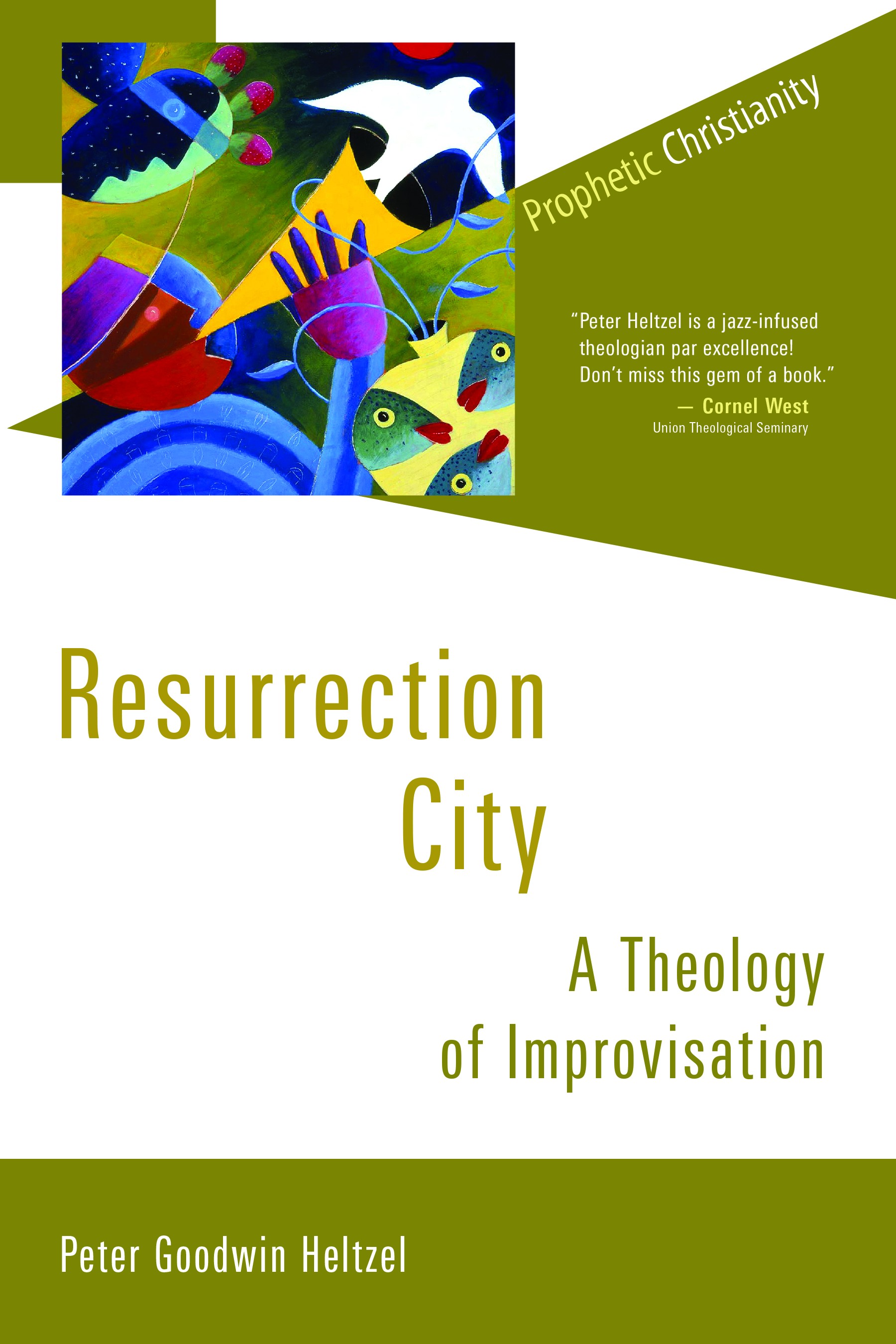 Kingdom edited by Bruce Ellis Benson, Malinda Elizabeth Berry & Peter Goodwin Heltzel (Eerdmans) $25.00
Kingdom edited by Bruce Ellis Benson, Malinda Elizabeth Berry & Peter Goodwin Heltzel (Eerdmans) $25.00
Shalom and the Community of Creation: An Indigenous Vision Randy S. Woodley (Eerdmans) $25.00
Resurrection City: A Theology of Improvisation Peter Goodwin Heltzel (Eerdmans) $25.00
My, my, these are among the most amazing books I’ve seen in a while, right up our line, thoughtful, profound, seriously done but often very moving, rich, rewarding, stimulating. These are grounded in the best and deepest strains of evangelicalism and yet are reaching out in ways that illustrate the reforming impulse and social vision of a profoundly Christ-centered care for God’s hurting world. Can the theological resources and spiritual energies of evangelicalism be harnessed towards cultural renewal? Is there a sense in which that the first things of the gospel are counter-cultural, even prophetic? These authors say yes, and bring new layers of insight and new language for describing this. Look, some of us have been saying this sort of thing for years. Some who are not evangelicals have been saying things like this from their o
wn faith traditions and particular sort of pieties. Everybody should be exceedingly glad when this kind of work is done, and I am fully confident that these books are not only notable and good, but are truly, truly award-winning caliber.
In the first, Prophetic Evangelicals, each of the dozen authors involved offers one word — truth, justice, shalom and the like — and offers profound, meaty reflections. Excellent! A great endorsement by Richard Mouw reminds us of how good this stuff is.
In the second, Shalom and the Community of Creation, Native American theologian and activist Randy Woodley shows how a First Nations view of land and creation enhances our view of the nature of Biblical shalom. I cannot tell you how important and good and righteous it is — doubtlessly one of the most important books in the “creation care” conversation in years! Highly recommended!
The third, new one, Resurrection City, by Peter Goodwin Heltzel, is truly one of the most mind-blowing, amazing books I’ve read in years. It draws on Howard Thurman and Martin Luther King and it draws on John Coltrane, doing public theology for shalom as an act of free-form improvisation. Others have drawn on jazz for similar projects, but nobody has done it this well; not even close. This is brilliant and urgent, learned and cool. As Cornel West writes, “Peter Heltzel is a jazz-infused theologian par excellence! Don’t miss this gem of a book.”
BEST SERIES THAT IS COMPLETED IN 2012 — OUR FIRST EVER SEXTET AWARD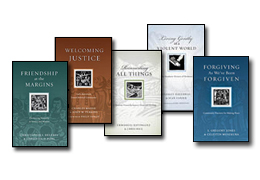
Here we show the first five.
How can I describe briefly all six of these? Well, just know this: each one brings together a scholar and an activist, or, put differently, an academic and a practitioner. They have emerged from the Center for Reconciliation at Duke Divinity School, which is headed by Chris Rice, who wrote the first book in the series with African bishop, Emmanuel Katongole. Each short book ruminates on how reconciliation works out in a certain side of life, or in a certain locale. They are thoughtful but include great first-hand stories and moving — sometimes achingly so — testimonies. They are exactly the sort of books we love, informed and passionate, mature but easily read, good for reading groups or discipleship classes.
The combo of authors is fantastic! You can understand then, that, for instance, in Living Gently in a Violent World, the one with Jean Vanier there are stories from his work at L’Arche, with persons with disabilities; in the one on forgiveness Célestin Musekura speaks about forgiving those who killed his family during the Rwandan genocide — it is very powerful! The one called Living Without Enemies is remarkable, telling of a community that organized prayer vigils to combat gang and domestic violence. Friendship at the Margins is the best book we’ve ever seen about short term mission trips, helping us move away from a “helping” model to experience and enjoy greater mutuality. It is profound, but good to use with groups heading out to serve.
The one that came out in 2012 to complete the set is called Making Peace with the Land: God’s Call to Reconcile with Creation and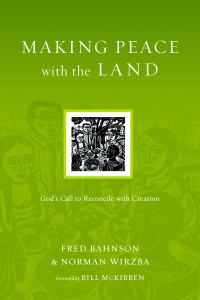 is one of my favorites, reminding us (in a way, coming full circle to where the series began with the superb Reconciling All Things) that God in Christ is busy not just bringing healing to our relationship with God, or even reconciling human relationships, but is bringing restoration to all things, including the very created order. If we cannot have reconciliation with the land upon which we depend, little else, it seems, will matter for long. And if we can realize that God is restoring the whole groaning creation, we will certainly be well on our way to all sorts of fruitful other social concerns. Wirzba is an agrarian theologian at Duke, and his co-author is Fred Bahnson an energetic and well known farmer and environmentalist. It is so, so nicely done, visionary but quite practical, too, even lovely at times, helping us all shift to more gentle, sustainable lifestyles, shifting away from industrial agriculture, practicing the presence of God” and experiencing communion, even as we grow or buy and prepare and eat our daily meals.
is one of my favorites, reminding us (in a way, coming full circle to where the series began with the superb Reconciling All Things) that God in Christ is busy not just bringing healing to our relationship with God, or even reconciling human relationships, but is bringing restoration to all things, including the very created order. If we cannot have reconciliation with the land upon which we depend, little else, it seems, will matter for long. And if we can realize that God is restoring the whole groaning creation, we will certainly be well on our way to all sorts of fruitful other social concerns. Wirzba is an agrarian theologian at Duke, and his co-author is Fred Bahnson an energetic and well known farmer and environmentalist. It is so, so nicely done, visionary but quite practical, too, even lovely at times, helping us all shift to more gentle, sustainable lifestyles, shifting away from industrial agriculture, practicing the presence of God” and experiencing communion, even as we grow or buy and prepare and eat our daily meals.
I love the handsome covers of this paperback set, appreciate the way each is written, and am so glad for such a thoughtful, varied, but uniform sort of coherent series. We tip our hat with great appreciation for Duke’s Center for Reconciliation, to IVP for doing this sort of profound, practical theology, and especially to Wirzba and Bahnson for doing this final, glorious volume. Three cheers, times two, saluting and honoring all six!
BEST DEVOTIONAL (TIE)
5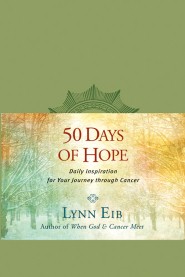 0 Days of Hope: Daily Inspiration for your Journey Through Cancer Lynn Eib (Tyndale) $13.99 From the lovely green faux leather and wrap-around band that invites you to hold this small book closely, to the glowing, crisp writing, to the profoundly comforting messages, this daily devotional meets a need unlike any similar book. We know Lynn, and we know her story (and her gracious, good ministry, and her great writing skill, seen previously in books like When God and Cancer Meet.) We thought this book was very special, and have appreciated the opportunity to share it. What makes us really want to honor it, though, as a “Best of 2012” book this year, is that several customers with cancer have used it and assured us it was life-giving, helpful, just right for their great needs. Nothing assures us like those sorts of testimonials, from people we love and trust. Thanks, Lynn, for caring, and thanks to the publisher for doing just a classy job on this little, live-saving book.
0 Days of Hope: Daily Inspiration for your Journey Through Cancer Lynn Eib (Tyndale) $13.99 From the lovely green faux leather and wrap-around band that invites you to hold this small book closely, to the glowing, crisp writing, to the profoundly comforting messages, this daily devotional meets a need unlike any similar book. We know Lynn, and we know her story (and her gracious, good ministry, and her great writing skill, seen previously in books like When God and Cancer Meet.) We thought this book was very special, and have appreciated the opportunity to share it. What makes us really want to honor it, though, as a “Best of 2012” book this year, is that several customers with cancer have used it and assured us it was life-giving, helpful, just right for their great needs. Nothing assures us like those sorts of testimonials, from people we love and trust. Thanks, Lynn, for caring, and thanks to the publisher for doing just a classy job on this little, live-saving book.
BEST DEVOTIONAL (TIE)
S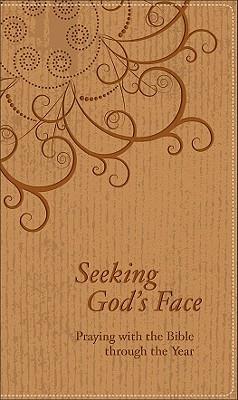 eeking God’s Face: Praying the Bible through the Year [compact edition] edited by Philip Reinders (Faith Alive) $24.99 This is a daily prayer book that draws from the ancient Christian tradition of reading devotionally, praying the hours of the office, using the Bible to speak back to God. (This is a simplified version, designed for once-a-day use.) This orderly structure allows for a close reading of the text, inviting a rather contemplative tone of prayerful engagement. Further, offering an entire year of prayers, it does seem grounded in the flow of the liturgical calendar. It uses historic creeds and confessions. (The publisher is affiliated with the Christian Reformed Church so some of these are from the Reformed tradition.) There is a nice foreword by Eugene Peterson, and it is made with a lovely imitation leather with some handsome tooling on the soft tan cover. The lovely previous version is larger, and it may be better for some who appreciate the larger font. This compact one was released just this year, so deserves
eeking God’s Face: Praying the Bible through the Year [compact edition] edited by Philip Reinders (Faith Alive) $24.99 This is a daily prayer book that draws from the ancient Christian tradition of reading devotionally, praying the hours of the office, using the Bible to speak back to God. (This is a simplified version, designed for once-a-day use.) This orderly structure allows for a close reading of the text, inviting a rather contemplative tone of prayerful engagement. Further, offering an entire year of prayers, it does seem grounded in the flow of the liturgical calendar. It uses historic creeds and confessions. (The publisher is affiliated with the Christian Reformed Church so some of these are from the Reformed tradition.) There is a nice foreword by Eugene Peterson, and it is made with a lovely imitation leather with some handsome tooling on the soft tan cover. The lovely previous version is larger, and it may be better for some who appreciate the larger font. This compact one was released just this year, so deserves
our special mention.
BEST BOOK OF PASTORAL CARE
D ementia: Living in the Memories of God John Swinton (Eerdmans) $25.00 There may be more practical books, clear guides to doing care-giving sorts of things, but for a rich, detailed, thorough-going effort to ask the biggest questions about a sad reality, this book is extraordinary. It is well written (which is not always the case in heavy books.) It is constructive. It is quite creative, yet solid — as Stephen Post, who calls it “a breath of fresh air” writes, “Dementia is a brilliant book that stays true to everything meaningful in Christian ethics, theology, and care.” As Stanley Hauerwas writes, “Swinton has clearly become the premier pastoral theologian of our time… Dementia: Living in the Memories of God will become a classic.” Give this serious theologian a blue ribbon to honor his contribution to religious publishing in 2012!
ementia: Living in the Memories of God John Swinton (Eerdmans) $25.00 There may be more practical books, clear guides to doing care-giving sorts of things, but for a rich, detailed, thorough-going effort to ask the biggest questions about a sad reality, this book is extraordinary. It is well written (which is not always the case in heavy books.) It is constructive. It is quite creative, yet solid — as Stephen Post, who calls it “a breath of fresh air” writes, “Dementia is a brilliant book that stays true to everything meaningful in Christian ethics, theology, and care.” As Stanley Hauerwas writes, “Swinton has clearly become the premier pastoral theologian of our time… Dementia: Living in the Memories of God will become a classic.” Give this serious theologian a blue ribbon to honor his contribution to religious publishing in 2012!
BEST BOOK OF PASTORAL CARE – RUNNER UP
S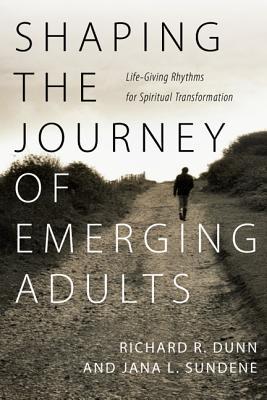 haping the Journey of Emerging Adults: Life Giving Rhythms for Spiritual Transformation Richard Dunn & Jana Sundene (IVP) $18.00 What pastor — or parent, youth worker, college employee, or older sibling, for that matter — doesn’t want to really figure out how best to befriend and serve and mentor those young adults that are between adolescence and full adulthood. This (fairly recent) stage of life, sometimes called “the critical years” (a phrase coined by Sharon Parks), is increasingly complex, and increasingly studied. If you read You Lost Me by David Kinnaman — one of the Best Books of last year, now out in DVD! — you know that many churches are struggling to engage and retain younger adults. This book will take that mission to the next level, helping older generations understand and mentor twenty somethings. I think that even if you are a twenty something, this book would be helpful, inviting self awareness, self reflection, and, maybe, deepening your own heart to reach out in Christina ministry to your own peers. As Drew Dyck (Generation Ex Christian) writes, “This book is crammed with wisdom and couldn’t have come at a better time. Indispensable reading for anyone who loves the younger generation.” Plus, it is really, really well written, with some sentences nearly sounding as lavish as good poetry. Know anybody who works on college campuses, who counsels young adults, who works in singles ministry or cares about twenty-somethings? Get them this book! Congrats to Dunn and Sundene for doing such very good work on such a very timely matter.
haping the Journey of Emerging Adults: Life Giving Rhythms for Spiritual Transformation Richard Dunn & Jana Sundene (IVP) $18.00 What pastor — or parent, youth worker, college employee, or older sibling, for that matter — doesn’t want to really figure out how best to befriend and serve and mentor those young adults that are between adolescence and full adulthood. This (fairly recent) stage of life, sometimes called “the critical years” (a phrase coined by Sharon Parks), is increasingly complex, and increasingly studied. If you read You Lost Me by David Kinnaman — one of the Best Books of last year, now out in DVD! — you know that many churches are struggling to engage and retain younger adults. This book will take that mission to the next level, helping older generations understand and mentor twenty somethings. I think that even if you are a twenty something, this book would be helpful, inviting self awareness, self reflection, and, maybe, deepening your own heart to reach out in Christina ministry to your own peers. As Drew Dyck (Generation Ex Christian) writes, “This book is crammed with wisdom and couldn’t have come at a better time. Indispensable reading for anyone who loves the younger generation.” Plus, it is really, really well written, with some sentences nearly sounding as lavish as good poetry. Know anybody who works on college campuses, who counsels young adults, who works in singles ministry or cares about twenty-somethings? Get them this book! Congrats to Dunn and Sundene for doing such very good work on such a very timely matter.
BEST BOOK FOR CHRISTIAN COUNSELORS
C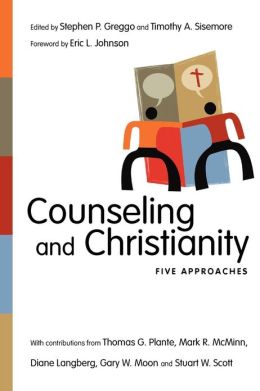 ounseling and Christianity: Five Approaches edited by Stephen P. Greggo and Timothy A. Sisemore (CAPS and IVP) $22.00 We think these sorts of multi-authored books representing authors of differing views are so helpful, and, to be honest, am not sure why others don’t flock to get them — maybe many people have their minds made up about most things. Ha, not I! I need these kinds of books! Here you have five very good arguments for five different models of the relationship of faith and counseling by stellar practitioners. We have previously highly recommended a similar, more theoretic book, Christianity and Psychology: Five Views edited by Eric Johnson and published by IVP ($22.00), which debates the strengths and weaknesses of five models of how to integrate faith and the field of psychology. All five authors in that volume agree that there is a fundamental relationship, but what that looks like how one does the faith/scholarship connection, that is the question. In that book, as with others that are in this format, not only do you get a good chapter presenting one view, but each author offers a response to each other, so you get to read critique and reply. What a learning experience!
ounseling and Christianity: Five Approaches edited by Stephen P. Greggo and Timothy A. Sisemore (CAPS and IVP) $22.00 We think these sorts of multi-authored books representing authors of differing views are so helpful, and, to be honest, am not sure why others don’t flock to get them — maybe many people have their minds made up about most things. Ha, not I! I need these kinds of books! Here you have five very good arguments for five different models of the relationship of faith and counseling by stellar practitioners. We have previously highly recommended a similar, more theoretic book, Christianity and Psychology: Five Views edited by Eric Johnson and published by IVP ($22.00), which debates the strengths and weaknesses of five models of how to integrate faith and the field of psychology. All five authors in that volume agree that there is a fundamental relationship, but what that looks like how one does the faith/scholarship connection, that is the question. In that book, as with others that are in this format, not only do you get a good chapter presenting one view, but each author offers a response to each other, so you get to read critique and reply. What a learning experience!
Well, this 2012 one builds on that discussion, and gets much more practical, as five schools of thought, all which want to be seen as faithful Christian approaches, debate what authentic Christian counseling actually looks like in practice. This is a fabulous opportunity to step back and reconsider (or consider, perhaps, for the first time) just how faith, spirituality, the role of the Bible and the like all inform what counselors do behind closed doors. If you are a counselor, interested in serious care-giving, know any psychologists or mental-health workers, or have ever been in therapy, this really is a one-of-a-kind resource, excellently compiled, with the divergent views civilly argued. Discerning what is most faithful is so very important. Some views are, naturally, better than others. You can decide which are the more wise, and which are less appropriate. There is no other book like this, about counseling practices, and we want to shout about it from the rooftops! Join us in celebrating this book, and the conversation it will deepen and illuminate.
AWARD FOR MOST CREATIVE PRESENTATION OF BIBLE BACKGROUND INFORMATION
A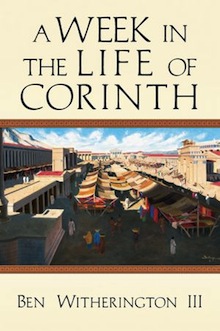 Week in the Life of Corinth Ben Witherington III (IVP) $16.00 I suppose it is an occupational hazard, but sometimes I intend to skim a book, check it out, get its gist, and move on. Late, late that night, I end up bleary eyed, unable to stop reading — it is the sign of a good book, of course. This is so very interesting, doing a fictional bit where a story unfolds in first century Corinth. No, it is not too graphic. Yes, the protagonist gets out alive. And, no, this does not substitute for careful exegetical work, the kind of detailed commentary that Witherington is most known for. But if it is true that the New Testament epistles are part of a larger narrative, letters addressing certain topics to particular churches in specific places, then entering that narrative (even as a creative device) can only enhance our imagining the context and meaning and implications of the epistles. Wow, what a story this is, what a fun way to learn the storied background of this troubled church in this crazy city. If you care at all about Paul’s mission, if you want to read the New Testament on its own terms, this short novella could unlock so, so much. Craig Keener says “this book provides a uniquely enjoyable way to learn about ancient culture and Paul’s mission in Corinth my immersion.” Of course there is careful research behind it; the details are well chosen and the background impeccably rendered. But it is a good story,entertaining and informative. This has only been tried a few times before, none to such great success. Give this guy a Greco-Roman trophy!
Week in the Life of Corinth Ben Witherington III (IVP) $16.00 I suppose it is an occupational hazard, but sometimes I intend to skim a book, check it out, get its gist, and move on. Late, late that night, I end up bleary eyed, unable to stop reading — it is the sign of a good book, of course. This is so very interesting, doing a fictional bit where a story unfolds in first century Corinth. No, it is not too graphic. Yes, the protagonist gets out alive. And, no, this does not substitute for careful exegetical work, the kind of detailed commentary that Witherington is most known for. But if it is true that the New Testament epistles are part of a larger narrative, letters addressing certain topics to particular churches in specific places, then entering that narrative (even as a creative device) can only enhance our imagining the context and meaning and implications of the epistles. Wow, what a story this is, what a fun way to learn the storied background of this troubled church in this crazy city. If you care at all about Paul’s mission, if you want to read the New Testament on its own terms, this short novella could unlock so, so much. Craig Keener says “this book provides a uniquely enjoyable way to learn about ancient culture and Paul’s mission in Corinth my immersion.” Of course there is careful research behind it; the details are well chosen and the background impeccably rendered. But it is a good story,entertaining and informative. This has only been tried a few times before, none to such great success. Give this guy a Greco-Roman trophy!
BEST THEOLOGICAL & ECCLESIASTICAL SMACK-DOWN OF THE YEAR
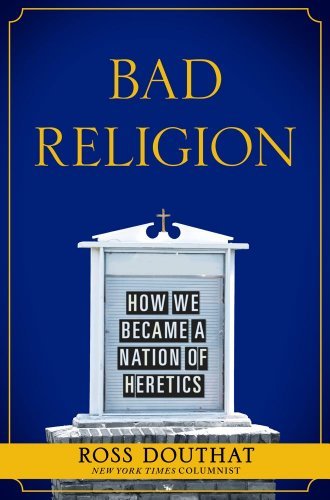

Christianity After Religion: The End of the Church and the Birth of a New Spiritual Awakening Diana Butler Bass (HarperOne) $25.99
Bad Religion: How We Became a Nation of Heretics Ross Douthart (Free Press) $26.00
I don’t watch WWF, but we’ve all heard of these raging clowns, fighting to the finish, in some flamboyant smack-down. Well, this certainly isn’t like that, as both authors are very good thinkers, very sharp leaders, and make very good arguments for their respective views in their prestigious books, each published by important houses. That both authors released their books to big and loud attention this spring, with not a little snark from both in interviews and tons of social media, well, it just seemed like a bit of a cat fight was brewing by early last summer. But we are awarding these books together, not for the sideshow — that is just me being goofy with my dumb award show schtick — but for the substantive and important sociological and theological work being done by these two important observers of American religion. It really is true that I value both books. A lot. I want to honor them both.
F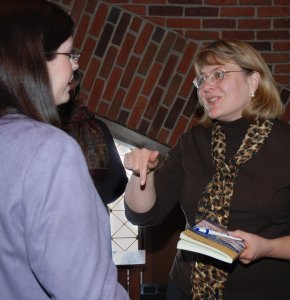 ull disclosure: I religiously tend towards the conservative theology of Douthart, who insists that much of the travail of our contemporary churches is, in fact, from bad theology, from the embracing of heresies of various sorts. Further, I am friends with Diana Butler Bass, who I find engaging, interesting, provocative, and often really, really right about a lot. She travels a lot in mainline churches and is tireless in working for church renewal, busy in the trenches, so to speak. Douthart is a conservative Catholic, Diana is a liberal Episcopalian. He blames her ilk for the demise of religion in our time; she is sure that his call to retrenchment is just the thing that we do not need, certainly not now in these changing postmodern times.
ull disclosure: I religiously tend towards the conservative theology of Douthart, who insists that much of the travail of our contemporary churches is, in fact, from bad theology, from the embracing of heresies of various sorts. Further, I am friends with Diana Butler Bass, who I find engaging, interesting, provocative, and often really, really right about a lot. She travels a lot in mainline churches and is tireless in working for church renewal, busy in the trenches, so to speak. Douthart is a conservative Catholic, Diana is a liberal Episcopalian. He blames her ilk for the demise of religion in our time; she is sure that his call to retrenchment is just the thing that we do not need, certainly not now in these changing postmodern times.
What I really would like to do is moderate some kind of forum with these two authors — or, less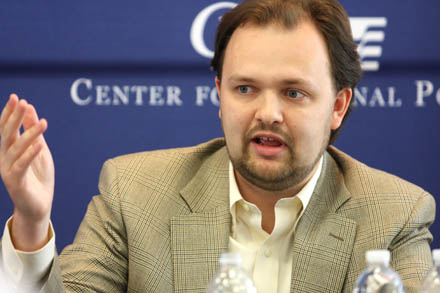 dramatic, but maybe not likely, at least offer some kind of award for anybody who has read ’em both and found each to be often quite right! Is anybody out there as appreciative of both as I am? As confused as I am? In naming these two together, we affirm that they need to be read together, each in dialogue with the other. Honorable and sane, yes?
dramatic, but maybe not likely, at least offer some kind of award for anybody who has read ’em both and found each to be often quite right! Is anybody out there as appreciative of both as I am? As confused as I am? In naming these two together, we affirm that they need to be read together, each in dialogue with the other. Honorable and sane, yes?
Diana, as you should know, spent about a decade studying ordinary neighborhood churches, doing rigorous research, celebrating those that have good habits of doing good work — spiritual formation, hospitality, creative worship, social action — and reported back in a string of books (most notably Church for the Rest of Us) explaining that, regardless of what the media says, conservative evangelicalism and mega-church wowza aren’t the only signs of religious life alive in the land. Quiet, ordinary places are doing well, less interested in dogma and more in practices, thank you very much.
Alas, she has come to believe that isn’t quite so any more. From glitzy mega-churches to the most intentionally progressive practicing congregations, nobody is doing very well. No denomination is growing. The stats are in; people are increasingly disinterested in church. Yet, she notes, there is a very strong interest in spirituality outside of the conventional congregations. The next great awakening is happening, like it or not, and the church may or may not have much to do with it. Her provocative book proposes that we meet people “where they are” (as we say) and create a contextualized theology and ministry that makes sense to those within our post-Christian culture. With her suburban mom look, often sporting a lovely string of pearls, Diana doesn’t seem like the poster child for the tattooed emergent church, but there you have it. As the back cover puts it, this fresh movement of spiritual seeking is “remaking the faith.” Yup.
Phyllis Tickle calls the book a “blockbuster” and Rob Bell says it is “spot on prophetic.”
For Mr. Douthat, whose grim book is considered by smart evangelicals, at least, a must-read, slam-dunk expose of what is wrong in the land of confused doctrine and mushy faith, this sort of talk in Christianity After Religion is, in many ways, just a rehash of classic liberalism, which ruined mainline churches in the middle to last half of the 20th century. He’s not having any of it. In what I think are helpful and often astute ways — not unlike Diana Butler Bass, but with different theological loyalties — Douthat looks at how sociological factors (such as the rise of an elevated view of the self, driven by soft psychology and hard consumerism, not to mention the infamous and vastly significant sexual revolutions) have bested historic, orthodox convictions about the nature of things. Long standing assumptions about the right ordering of life, supposedly derived from historic theology and Biblical truths, have been eroded by modernity, and all sorts of religious groups in America — Catholic, mainline, and evangelical — are awash in all manner of confusing reconfigurations about beliefs and behaviors. Our confusions about our heresies are at the heart of our problems; we must turn back, he says, before it is too late.
It would be silly to suggest, by the way, that Douthart just doesn’t want anything to change, that he is a fuddy-duddy traditionalist, or that, as one reviewer shrieked, he thinks the availability of The Pill in the ’60s is what ruined everything. But it would also be ill-informed not to more faithfully understand what changes in the culture contributed in dubious ways to how we now approach theology and how we do church. It should be asked if some of these new ways have not served us well. What does it mean to be “in the world but not of it” and to be steadfast in our deepest convictions? Are our progressive tendencies really the answer to a post-religious faith, or have they been hurtful? Do heresies liberate us, or do they damage us?
Bad Religion is a very important book evaluating very important matters and, as such, is one of the more important books of the year.
I greatly appreciated both books, although both have some pages that made me scratch my head. Both books are confident, strongly written, sometimes blunt in their denunciations and often quite passionate in their proposals. (Truth be told, Diana’s is, while building on significant research and data, more engaging, includes more interesting stories, is written more graciously, and seems a bit more open-ended about what we might do next while Mr. Douthat, New York Times essayist and pundit that he is, is more directly polemical. I think, content aside, the different styles may tend to be more appreciated by different sorts of readers.)
In awarding a “Best of 2012” shout-out to both books simultaneously, I am suggesting we should dare to think that both books have great merit, that both are to be taken seriously, and that in the mix of good conversation and holy discernment and even hard-headed debate about and between them, we can gain greater appreciation of what faithfulness looks like in our increasingly interesting times. ![]()
Does it need to be a smack-down, a loud show, with only one winner, bloodying the other? No, no, it does not! Again, no, it must not! I know that it is unlikely, even for our open-minded, H&M fans, to fully embrace both books. Fans of each have badmouthed the other. For now, it looks like that is our impasse, most people only considering one of the two views. This speaks volumes into the nature of our times, I suppose, and I realize we are swimming upstream on this one. Awarding them both? Inviting the fight??
No, no, it does not! Again, no, it must not! I know that it is unlikely, even for our open-minded, H&M fans, to fully embrace both books. Fans of each have badmouthed the other. For now, it looks like that is our impasse, most people only considering one of the two views. This speaks volumes into the nature of our times, I suppose, and I realize we are swimming upstream on this one. Awarding them both? Inviting the fight??
My tongue in cheek WWF smackdown bit might remind us to keep the dialogue going, to keep at this, together, remembering our most basic commitment to Christian unity. I am glad for both of these stimulating books, books I commend and are happy to honor in our own little way here. We invite you and your reading groups to consider each, comparing and contrasting them, the arguments they make, the concerns they take up, the assumptions they hold. Let’s not avoid, but embrace and maybe even enjoy the debate, learning to grapple with this stuff with grace and civility. After all, those wild WWF guys and gals really do seem to being have fun.
BEST THEOLOGICAL BOOK MAKING A CASE FOR NEW WAYS OF UNDERSTANDING
H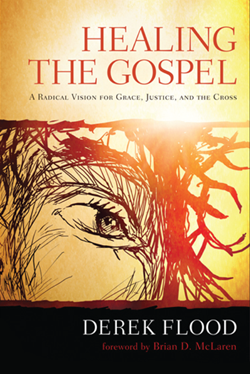 ealing the Gospel: A Radical Vision for Grace, Justice, and the Cross Derek Flood (Cascade) $17.00 I am confident that no one of us can ever plumb the depths of the meaning of the cross. And I am confident that those who insist on one reading, one emphasis, are simply not being Biblical, which, itself, offers a variety of metaphors, images, and ways of talking about God’s redemptive work, seen in Christ’s death and resurrection. There have been many books insisting on a traditional model, and there have been many books insisting we reject that model. I think they are very valuable to read, an area of study that is important, and conversation that is robust and often insightful. I have written elsewhere about books that grapple with this matter in moderate, multi-faceted ways. This book calls for a new approach, and in many ways is quintessential in this nonviolent approach. Jesus did not die to appease a wrathful God’s demand for punishment, and Jesus doesn’t save us from that kind of a God. His “good news” is of a more radical sort — and Flood insists that the Biblical writers themselves, including the Apostle Paul, were grounded in a deep “restorative justice” mindset, that assumes love of enemies, not retribution. Drawing even on the provocative French philosopher Rene Girard, many are working on this angle these days. This is the best I’ve seen in this movement.
ealing the Gospel: A Radical Vision for Grace, Justice, and the Cross Derek Flood (Cascade) $17.00 I am confident that no one of us can ever plumb the depths of the meaning of the cross. And I am confident that those who insist on one reading, one emphasis, are simply not being Biblical, which, itself, offers a variety of metaphors, images, and ways of talking about God’s redemptive work, seen in Christ’s death and resurrection. There have been many books insisting on a traditional model, and there have been many books insisting we reject that model. I think they are very valuable to read, an area of study that is important, and conversation that is robust and often insightful. I have written elsewhere about books that grapple with this matter in moderate, multi-faceted ways. This book calls for a new approach, and in many ways is quintessential in this nonviolent approach. Jesus did not die to appease a wrathful God’s demand for punishment, and Jesus doesn’t save us from that kind of a God. His “good news” is of a more radical sort — and Flood insists that the Biblical writers themselves, including the Apostle Paul, were grounded in a deep “restorative justice” mindset, that assumes love of enemies, not retribution. Drawing even on the provocative French philosopher Rene Girard, many are working on this angle these days. This is the best I’ve seen in this movement.
Michael Gorman writes “In this readable and balanced book, Flood gently — yet firmly and provocatively — challenges and enriches your understanding of the cross….such amazing love beckons us to follow in the way of Jesus and justice. It is a book to read, mark, and inwardly digest.” Phyllis Tickle says it “brilliantly takes on the the story of the Christian doctrine of atonement, turns that story on its end, and then lays out before us a beauty almost beyond theology.” Michael Hardin, who is one of the genius writers in this whole “nonviolent atonement” project, says that none of the recent spate of books “treat the salvific healing of Jesus’ death better than this one.” This is quite a strong endorsement, and I knew this book must be listed as noteworthy.??Many conventional readers will find this project concerning. But aren’t there questions you have about this, don’t some Bible verses seem odd, aren’t there some ways of talking about the cross that end up being inconsistent with what we know of God’s goodness? Are you afraid to revisit old truths, holding them up for Biblical scrutiny? Agree or not, this is as thoughtful book, offering a creative and concise approach, to what for some of us is the very heart of the gospel. It would do you good to explore this topic, and this is the perfect entry-level study to do so. This book insists that Christ’s gospel exposes violence, it does not support it, and we must learn to do our theology in ways that are consistent with this Christlikeness. A book that helps us explore with deep attention the wondrous cross, surely is worth considering. We are happy to say it is one of the books of the year.
BEST THEOLOGICAL BOOK MAKING A CASE FOR OLD WAYS OF UNDERSTANDING
B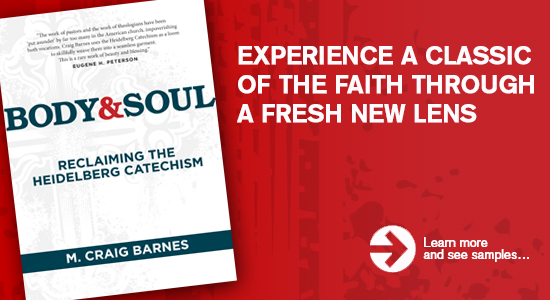 ody&Soul: Reclaiming the Heidelberg Catechism M. Craig Barnes (Faith Alive) $14.99 I know it is a long shot to get many ordinary church members (of any denomination or style) to study theology. (And, I know it is also a stretch, sometimes, to get academics to read devotional books, that they might think have little to offer them.) This easy to read book is remarkable for any number of reasons, but it surely can be used by common folks, and will also stimulate the heart and mind of deeper thinkers. Barnes has been a good author over the years, a pastor of a good Presbyterian church in Pittsburgh, and is now the newly installed President of Princeton Theological Seminary. This marvelous 450-year old confession has been fruitfully used (mostly in Reformed Churches) and is so very rich, reminding us of our serious guilt, God’s good grace, and of our respondent gratitude. Barnes is a thoughtful guy, but still a preacher and pastor, so he brings the marvelous truths of Heidelberg into common language. Thank goodness for Faith Alive, who also published a companion six-session DVD which we gladly stock. This is something for which some of us have been waiting for years !
ody&Soul: Reclaiming the Heidelberg Catechism M. Craig Barnes (Faith Alive) $14.99 I know it is a long shot to get many ordinary church members (of any denomination or style) to study theology. (And, I know it is also a stretch, sometimes, to get academics to read devotional books, that they might think have little to offer them.) This easy to read book is remarkable for any number of reasons, but it surely can be used by common folks, and will also stimulate the heart and mind of deeper thinkers. Barnes has been a good author over the years, a pastor of a good Presbyterian church in Pittsburgh, and is now the newly installed President of Princeton Theological Seminary. This marvelous 450-year old confession has been fruitfully used (mostly in Reformed Churches) and is so very rich, reminding us of our serious guilt, God’s good grace, and of our respondent gratitude. Barnes is a thoughtful guy, but still a preacher and pastor, so he brings the marvelous truths of Heidelberg into common language. Thank goodness for Faith Alive, who also published a companion six-session DVD which we gladly stock. This is something for which some of us have been waiting for years !
Eugene Peterson notes of it, “The work of pastors and the work of theologians have been ‘put asunder’ by far too many in the American church, impoverishing both vocations. Craig Barnes uses the Heidelberg Catechism as a loom to skillfully weave them into a seamless garment. This is a rare work of beauty and blessing.” Body&Soul is tremendous, and we are thrilled to award it a Best Book of 2012 award, hoping its “beauty and blessing” reach many for years to come.
BEST BIG THEOLOGY BOOK OF THE YEAR I WISHED I HAD READ
G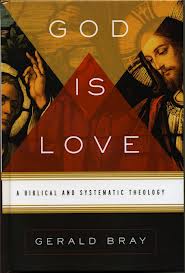 od Is Love: A Biblical and Systematic Theology Gerald Bray (Crossway) $40.00 How dumb of me is it to celebrate a title I admit to have not read? Well, it’s my job to size up books, and this is one I’ve skimmed, studied the footnotes, pondered the outline and flow, and taken in sample pages. One doesn’t have to have complete a thorough study to know this is is nearly in a class by itself. For starters, it has an eye to both systematic and Biblical theology. Secondly, it draws on both classic, orthodox views and engages some newer, contemporary voices. It is conservative, certainly, but seems to offer a fresh angle of vision — arranging doctrine and the ruminations around the theme of God’s great love. How fascinating! I do not know if I agree with everything here and I am sure there are thing
od Is Love: A Biblical and Systematic Theology Gerald Bray (Crossway) $40.00 How dumb of me is it to celebrate a title I admit to have not read? Well, it’s my job to size up books, and this is one I’ve skimmed, studied the footnotes, pondered the outline and flow, and taken in sample pages. One doesn’t have to have complete a thorough study to know this is is nearly in a class by itself. For starters, it has an eye to both systematic and Biblical theology. Secondly, it draws on both classic, orthodox views and engages some newer, contemporary voices. It is conservative, certainly, but seems to offer a fresh angle of vision — arranging doctrine and the ruminations around the theme of God’s great love. How fascinating! I do not know if I agree with everything here and I am sure there are thing
s I would have wanted said that Bray does not broach. But just listen to these blurbs. This is a book I wish I had time to read, and as I survey our three part lists of great books this year of our Lord 2012, this really should be included.
Gerald Bray is one of our leading evangelical scholars and teachers and he has given us here a magisterial overview of Christian belief and doctrine. A great example of theology in the service of the church.
–Timothy George, Founding Dean, Beeson Divinity SchoolSoaked in the depth and breadth of the Christian tradition, Gerald Bray brings a rich wisdom to his exceedingly accessible systematic theology. Freshly organizing his approach around love, Bray does not fall into cheap sentimentality, but instead carefully teases out the drama and story of divine love and how it should inform our understanding of countless areas of theology and life. Students and laity in particular will find this volume immensely helpful, and I heartily recommend it to all!
–Kelly M. Kapic, Professor of Theological Studies, Covenant CollegeIntimidated by theology books? This is the book for you. Here you’ll find a firm place to stand to take in the full panorama of Christian belief–centered around the wonderful and worship-inspiring truth of the love of God, and firmly anchored in the sure and certain word of God. If you’ve read Lewis’s Mere Christianity or Stott’s Basic Christianity and you long to know more, then you’re ready to move on to Gerald Bray’s God Is Love.
–Stephen Nichols, Research Professor of Christianity & Culture, Lancaster Bible College
BIGGEST, FATTEST BOOK OF 2012
W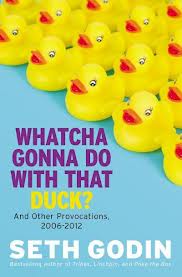 hatcha Gonna Do With That Duck? And Other Provocations 2006 – 2012 Seth Godin (Portfolio/Penguin) $32.00 Someday I might right a longer column on Seth Godin and he is an important, provocative, insightful, and in some ways irritating public intellectual and he deserves our attention. For now I can say this: I read his daily blogs every day, and almost always appreciate them. Sometimes they are sheer brilliance; occasionally I find myself disinterested, occasionally I think he is wrong. Mostly, though, he is a genius, and he is known for being a marketer who helps us, in this postmodern, electronic world, to get our messages out — our art created! — to just the right folks. Nobody needs to duplicate the mass marketed generic stuff of Wal Mart, but most people have some great gift, a passion and contribution, that somebody, somewhere will appreciate. Doing great work, shipping good stuff, connecting and wowing with a tribe that cares, this is what Godin reminds us of, over and over and over. Some days he is studying shifts in engineering and information science, other days he is motivating us to care deeply about the details of our craft, other days he is poking fun at boring, nondescript goods and services. Sometimes he holds up other entrepreneurs and non-profiteers, and other times he does passionate book reviews.
hatcha Gonna Do With That Duck? And Other Provocations 2006 – 2012 Seth Godin (Portfolio/Penguin) $32.00 Someday I might right a longer column on Seth Godin and he is an important, provocative, insightful, and in some ways irritating public intellectual and he deserves our attention. For now I can say this: I read his daily blogs every day, and almost always appreciate them. Sometimes they are sheer brilliance; occasionally I find myself disinterested, occasionally I think he is wrong. Mostly, though, he is a genius, and he is known for being a marketer who helps us, in this postmodern, electronic world, to get our messages out — our art created! — to just the right folks. Nobody needs to duplicate the mass marketed generic stuff of Wal Mart, but most people have some great gift, a passion and contribution, that somebody, somewhere will appreciate. Doing great work, shipping good stuff, connecting and wowing with a tribe that cares, this is what Godin reminds us of, over and over and over. Some days he is studying shifts in engineering and information science, other days he is motivating us to care deeply about the details of our craft, other days he is poking fun at boring, nondescript goods and services. Sometimes he holds up other entrepreneurs and non-profiteers, and other times he does passionate book reviews.
Want to stand out, share your vision, find your followers, do good work in the world, learn how to make a difference? His blog can help, his many books can help, his very presence in the marketplace has already helped. He is one of the top people of this sort in the world, arguably the most followed blogger and the most important marketer of our times. This fat book is a culling of his daily blogs from the 2006 on. It is a greatest hits of his short pieces. Even his other books aren’t that big, but these are read-in-one-quick-sitting meditations. One or two of these pieces might give you new ideas and keep you going. One or two will make you laugh and one or two might piss you off. One or two might change your life. This book, fun and fat as it is, should be on your desk. Do it.
THE “GIVE IT ONE MORE CHANCE” AWARD AFTER STARTING OFF ON THE WRONG FOOT
A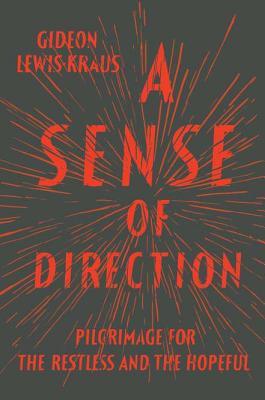 Sense of Direction: Pilgrimage for The Restless and The Hopeful Gideon Lewis-Kraus (Riverhead) $26.95 I am bringing this guy up on the stage not to embarrass him, but to compliment a writer who can do such a great job in the important last three-quarters after I had almost given up in the first. I was ready to slam the book shut, and he reeled me back in, and that is fairly rare. Life is too short to waste time with books that do not grab me, and I was underwhelmed, and at times pretty irritated, by the long, winding sentences and heavy descriptions of the ever-so-precious underground art world scene in Berlin in which the author lived, with a batch of pretentious performance artists, PR people, and those who are willing to have inconsequential days. Who has the time and money to hang out doing mostly nothing, with a little philosophizing, drinking and dance and sex on the side, in Berlin for a year? Rich artboys, I guess. I was annoyed, but kept reading, thinking his complex prose would capture me on another day. About 45 long pages in, after the third read of a couple of these make-it-or-break-it sections, I got it. I saw why Dave Eggers wrote that it is a “very smart, very moving book about being young and rootless and even wayward. With great compassion and zeal he gets at the question: Why search the world to solve the riddle of your own heart?”
Sense of Direction: Pilgrimage for The Restless and The Hopeful Gideon Lewis-Kraus (Riverhead) $26.95 I am bringing this guy up on the stage not to embarrass him, but to compliment a writer who can do such a great job in the important last three-quarters after I had almost given up in the first. I was ready to slam the book shut, and he reeled me back in, and that is fairly rare. Life is too short to waste time with books that do not grab me, and I was underwhelmed, and at times pretty irritated, by the long, winding sentences and heavy descriptions of the ever-so-precious underground art world scene in Berlin in which the author lived, with a batch of pretentious performance artists, PR people, and those who are willing to have inconsequential days. Who has the time and money to hang out doing mostly nothing, with a little philosophizing, drinking and dance and sex on the side, in Berlin for a year? Rich artboys, I guess. I was annoyed, but kept reading, thinking his complex prose would capture me on another day. About 45 long pages in, after the third read of a couple of these make-it-or-break-it sections, I got it. I saw why Dave Eggers wrote that it is a “very smart, very moving book about being young and rootless and even wayward. With great compassion and zeal he gets at the question: Why search the world to solve the riddle of your own heart?”
And then, the second two-thirds kicked in as they are off to walk the El Camino Trail, not as Catholic pilgrims, or even spiritually earnest seekers. What a story, so well told, with great attention to the author’s interior life, such as it is, in these times, on that journey. As another reviewer noted, “This is a brilliant meditation on what the spiritual and fraternal and paternal and communal might mean to a person right now.” This is a very well-written, seriously-crafted memoir of a secularized, hip young adult, trying to find order in his days, hour by hour, walking onward with so many others on this famed trail.
I’ve read other book on the Santiago pilgrimage — there are a number that we have — written by people of faith, but I wondered what a irreligious guy who writes for Harpers, Bookforum, and McSweeney’s would get out of it. It seemed intriguing, and it surely was. Check out this winning blurb: “If David Foster Wallace had written Eat, Pray, Love, it might have come close to approximating the adventure of Gideon Lewis-Kraus. A Sense of Direction is the digressively brilliant and seriously hilarious account of a fellow neurotic’s wanderings, and his hard-won lessons in happiness, forgiveness, and International pilgrim fashion.” Oh yeah, this isn’t for everybody. It does deserve a more than three-quarters honor. One of the best, finally.
FAVORITE NOVEL OF THE YEAR?
Thin Blue Smoke Doug Worgul (Burnside Books) $14.99 I did not read as many novels thi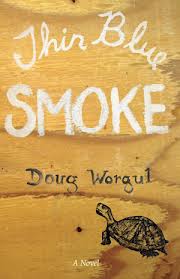 s year as I sometimes do (although I read several truly memorable memoirs, that feel almost like fiction.) This was, without a doubt, the fiction which captivated me the most, that I couldn’t put down, that I wanted to talk about. It is fairly long, with a lot of characters, and it comes together beautifully in the end — I was wiping away tears and wishing it wasn’t over. Maybe they’ll make a movie of this large, g
s year as I sometimes do (although I read several truly memorable memoirs, that feel almost like fiction.) This was, without a doubt, the fiction which captivated me the most, that I couldn’t put down, that I wanted to talk about. It is fairly long, with a lot of characters, and it comes together beautifully in the end — I was wiping away tears and wishing it wasn’t over. Maybe they’ll make a movie of this large, g
ood story. Kudos to Burnside books and our indie pals at Samzidat for releasing such a good story on a shoestring. Let’s get the word out on this!
It is overtly Christian, I guess, some of it set in church circles, but unlike much “Christian fiction” it has characters who cuss and fight, exploring some harsh terrains of real-world stuff. The author skillfully develops a very solid appreciation for its characters, rooted in the urban south. Although it is not an African American story, exactly, much of it is set within African American culture, which he gets really right, I think. The smoke of the title refers, at least, to the smokey business of the barbeque restaurant that the main characters operate, and I have to admit I’ve never read a book that includes so much talk about food, about meat preparations, (and about how different cities in the south have different schools of thought about barbeque, a matter about which the author is a known expert!) One of the main characters in this Kansas City story is a former baseball player, so there is a bit of that in there, too. Another is a hard-drinking, seriously doubting Episcopal priest and seminary professor who wrote one really great book, years ago. living on the fame of that, now in recovery, grieving a deceased father, possibly in love after a disastrous marriage to a blue blood model, eventually learning a sort of grace that seems to channel Frederick Buechner. Some of the story (which is not told chronologically) unfolds around the time of Martin Luther King in Memphis, although it is not primarily a civil rights saga. It is a great, captivating story and it really is about a small business, about food, about community and grace. The author has written two other notable books, interestingly, about barbeque. But he obviously knows people and the struggle to believe — the relationships are the soul of this great, smokey story.
NOVEL THAT MOST MADE ME THINK
T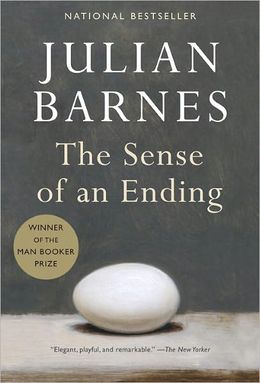 he Sense of an Ending Julian Barnes (Vintage) $14.95 From the first few pages, I was struck by the intellectual depth of this engaging story, about the nature of memory. This is a short, but serious British novel that won the prestigious Man Booker Prize when it was out in hardcover a year ago. The Los Angles Times called it “a jewel of conciseness and precision” and it was,one of the best books of the year on a dozen famous lists. The New York Times Book Review linked the style to Evelyn Waugh and even Ishiguro’s The Remains of the Day, calling Barnes a “subtly assertive practitioner of this quiet art.”
he Sense of an Ending Julian Barnes (Vintage) $14.95 From the first few pages, I was struck by the intellectual depth of this engaging story, about the nature of memory. This is a short, but serious British novel that won the prestigious Man Booker Prize when it was out in hardcover a year ago. The Los Angles Times called it “a jewel of conciseness and precision” and it was,one of the best books of the year on a dozen famous lists. The New York Times Book Review linked the style to Evelyn Waugh and even Ishiguro’s The Remains of the Day, calling Barnes a “subtly assertive practitioner of this quiet art.”
The story revolves around a long lost love affair, memory of that, and how it is recalled (redacted? corrected?) when there is reason to revisit the protagonists’ college years. Old friends show up with a vengeance, and there is powerful suspense, emotional depth in the telling, making this a page turner that left me pondering for weeks. I pressed it upon my wife, insisting she read it so we could compare notes. It was one of her favorites, as well. He’s already won the Booker, but we want to add our little gesture, here!
NOVEL THAT MOST MIGHT MAKE YOU THINK
In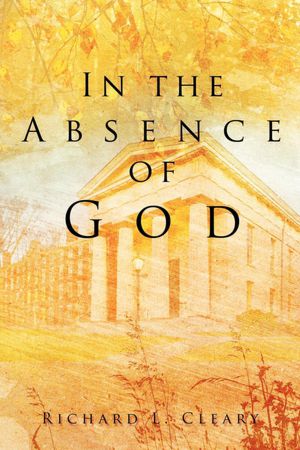
HISTORICAL NOVEL — BEST OF 2012
Il luminations: A Novel of Hildegard von Bingen Mary Sharratt (Houghton Mifflin Harcourt) $25.00 Much of the historical fiction that is popular in our shop involves evangelical women, orphans or lost loves, set among wagon trains, or maybe Victorian homes. The covers of so many look just the same. They are inspiring, entertaining, but often not the best literature. This book is a different sort of faith-based historical fiction, though; it is impeccably drawn, vibrantly written, fascinating and quite serious. One reviewer has called it “radiantly beautiful.” It is, as Margaret Frazer of the Dame Frevisse medieval mysteries puts it, “a thrilling adventure of the heart and mind, the richly told story of a woman fully of her time and yet courageous beyond the bound her time expected of her.” I assume you know a bit about the progressive, scientific, mystic and poet of the 12th century, although after this, you will know more about the Middle Ages, and more about women saints, and more about the religious life of women than you imagined. With recent interest in monastic spirituality, von Bingen is important, and this novel about this remarkable, controversial woman should be exceedingly popular. Maybe our blue ribbon celebrations will help — it deserves to be read!
luminations: A Novel of Hildegard von Bingen Mary Sharratt (Houghton Mifflin Harcourt) $25.00 Much of the historical fiction that is popular in our shop involves evangelical women, orphans or lost loves, set among wagon trains, or maybe Victorian homes. The covers of so many look just the same. They are inspiring, entertaining, but often not the best literature. This book is a different sort of faith-based historical fiction, though; it is impeccably drawn, vibrantly written, fascinating and quite serious. One reviewer has called it “radiantly beautiful.” It is, as Margaret Frazer of the Dame Frevisse medieval mysteries puts it, “a thrilling adventure of the heart and mind, the richly told story of a woman fully of her time and yet courageous beyond the bound her time expected of her.” I assume you know a bit about the progressive, scientific, mystic and poet of the 12th century, although after this, you will know more about the Middle Ages, and more about women saints, and more about the religious life of women than you imagined. With recent interest in monastic spirituality, von Bingen is important, and this novel about this remarkable, controversial woman should be exceedingly popular. Maybe our blue ribbon celebrations will help — it deserves to be read!
BEST Y.A. JUVENILE FICTION BOOK OF THE YEAR – 2012
W onder R.J. Palacio (Knopf) $15.99 I wrote about this before, and we want to honor this author and this book that starts off “I won’t describe what I look like. Whatever you’re thinking, it’s probably worse.” Entertainment Weekly says it is “a crackling page-turner filled with characters you can’t help but root for.” This truly is one memorable book, and most reviews have insisted that August Pullman is one character that readers will remember forever, and whose story is going to be legendary within the world of young adult fiction. The boy’s face is severely mal-formed, with one eye in the center of his face. How will he fare when he finally gets to go to public school? He is brave. Some of his classmates are brave. The story is stunning, funny at times, heartbreaking, poignant, clever. Palacio’s first-person writing is fabulously great (this is her first book) and the message is so very, very wonderful. Three really big, glad cheers!
onder R.J. Palacio (Knopf) $15.99 I wrote about this before, and we want to honor this author and this book that starts off “I won’t describe what I look like. Whatever you’re thinking, it’s probably worse.” Entertainment Weekly says it is “a crackling page-turner filled with characters you can’t help but root for.” This truly is one memorable book, and most reviews have insisted that August Pullman is one character that readers will remember forever, and whose story is going to be legendary within the world of young adult fiction. The boy’s face is severely mal-formed, with one eye in the center of his face. How will he fare when he finally gets to go to public school? He is brave. Some of his classmates are brave. The story is stunning, funny at times, heartbreaking, poignant, clever. Palacio’s first-person writing is fabulously great (this is her first book) and the message is so very, very wonderful. Three really big, glad cheers!
BEST CHILDREN’S DEVOTIONAL OF THE YEAR Thoughts to Make Your Heart Sing Sally Lloyd-Jones, illustrated by Jago (ZonderKidz) $16.99 This handy-sized hardback is in many ways a companion devotional to her
Thoughts to Make Your Heart Sing Sally Lloyd-Jones, illustrated by Jago (ZonderKidz) $16.99 This handy-sized hardback is in many ways a companion devotional to her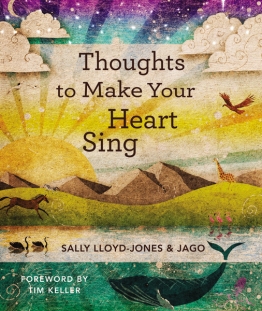 extraordinary, amazingly good children’s Bible, The Jesus Storybook Bible (ZonderKidz; $16.99 in hardback, $27.99 in a deluxe tan leather edition.) Jago’s clever artwork is more mature, here, very creative and striking — perhaps less playful, giving these wonderful meditations a bit more weight. These are substantive devotionals, still for elementary children, and we could hardly find a better young child’s collection of short pieces that this. As Sally plainly says in the first line of her brief note to young readers, “These thoughts are to remind you of things that are true.” Tim Keller’s foreword assures us that these one or two page devotions are “saturated with an understanding of the gospel.” What fun! What solid insight! What great art! One of the best books of its kind we’ve ever seen! Maybe you should get it for adults you know, too. I makes our hearts sing to offer a Hearts & Minds Best of the Year award to Sally Lloyd-Jones and this fabulous, visually-attractive, interesting book.
extraordinary, amazingly good children’s Bible, The Jesus Storybook Bible (ZonderKidz; $16.99 in hardback, $27.99 in a deluxe tan leather edition.) Jago’s clever artwork is more mature, here, very creative and striking — perhaps less playful, giving these wonderful meditations a bit more weight. These are substantive devotionals, still for elementary children, and we could hardly find a better young child’s collection of short pieces that this. As Sally plainly says in the first line of her brief note to young readers, “These thoughts are to remind you of things that are true.” Tim Keller’s foreword assures us that these one or two page devotions are “saturated with an understanding of the gospel.” What fun! What solid insight! What great art! One of the best books of its kind we’ve ever seen! Maybe you should get it for adults you know, too. I makes our hearts sing to offer a Hearts & Minds Best of the Year award to Sally Lloyd-Jones and this fabulous, visually-attractive, interesting book.
BEST CHILDREN’S PICTURE BOOK – HONORABLE MENTION
T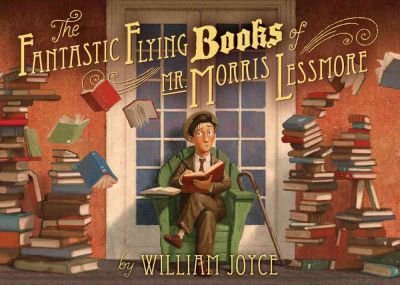 he Fantastic Flying Books of Mr. Morris Lessmore William Joyce (Atheneum) $17.99 I hope you know the stunning 2011 Short Film Academy Award winner of this name. This is the book that was drawn from that, and it is visually amazing, a great, great story, and a book-lover’s delight. This should have gotten more attention — we should have given it more attention. I think it is one of the great books of the year, one of the great children’s book in ages. We hope it not only brings much joy to young readers, but reminds us all of the importance of books. Three big cheers!
he Fantastic Flying Books of Mr. Morris Lessmore William Joyce (Atheneum) $17.99 I hope you know the stunning 2011 Short Film Academy Award winner of this name. This is the book that was drawn from that, and it is visually amazing, a great, great story, and a book-lover’s delight. This should have gotten more attention — we should have given it more attention. I think it is one of the great books of the year, one of the great children’s book in ages. We hope it not only brings much joy to young readers, but reminds us all of the importance of books. Three big cheers!
BEST CHILDREN’S PICTURE BOOK – HONORABLE MENTION
M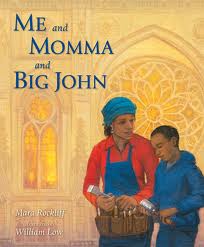 e and Momma and Big John Mara Rockliff, illustrated by William Low (Candlewick Press) $16.99 Here is what I wrote earlier in the year about this beautiful, beautiful book. We talk a lot here at BookNotes about the theological notion of calling, that we are all invited by God to step into a holy vocation, where our deepest gifts and passions and guided into work that matters. This is a tremendously useful book that is stunningly beautiful to gently raise conversations about work with young children. As a young child the author herself watched stone cutters working in the Cathedral of Saint John the Divine — the “Big John” of the story — so this tale of a craftsperson working to build the New York cathedral is spot on. Momma comes home from work tired and sore, explaining to her son that she works on just one stone. As it says on the flyleaf, “This touching story, inspired by one of the first women in the United States to learn the traditional craft of stonecutting, lovingly shows how having pride in one’s work, and ones momma, comes with great grace and dignity… As Momma tells John, ‘Building a cathedral isn’t just a job, it’s an art.'” William Low is an award-winning illustrator and painter himself. It is so nice to see the warmth of the cathedral, and the details of the interesting tools. This should be on everybody’s Best of the Year lists!
e and Momma and Big John Mara Rockliff, illustrated by William Low (Candlewick Press) $16.99 Here is what I wrote earlier in the year about this beautiful, beautiful book. We talk a lot here at BookNotes about the theological notion of calling, that we are all invited by God to step into a holy vocation, where our deepest gifts and passions and guided into work that matters. This is a tremendously useful book that is stunningly beautiful to gently raise conversations about work with young children. As a young child the author herself watched stone cutters working in the Cathedral of Saint John the Divine — the “Big John” of the story — so this tale of a craftsperson working to build the New York cathedral is spot on. Momma comes home from work tired and sore, explaining to her son that she works on just one stone. As it says on the flyleaf, “This touching story, inspired by one of the first women in the United States to learn the traditional craft of stonecutting, lovingly shows how having pride in one’s work, and ones momma, comes with great grace and dignity… As Momma tells John, ‘Building a cathedral isn’t just a job, it’s an art.'” William Low is an award-winning illustrator and painter himself. It is so nice to see the warmth of the cathedral, and the details of the interesting tools. This should be on everybody’s Best of the Year lists!
BEST CHILDREN’S PICTURE BOOK – HONORABLE MENTION
S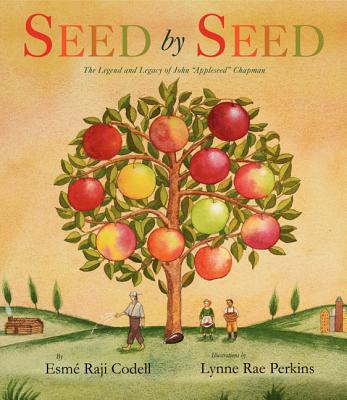 eed by Seed: The Legend and Legacy of John “Appleseed” Chapman Esme Raji Codell, illustrated by Lynne Rae Perkins (Greenwillow) $16.99 I knew from the moment I saw this that this would be one of our favorite picture books of the year! We adore this book. It has brightly colorful artwork, done in fairly traditional oil paintings, except a few pages that seem embroidered on cloth and one that looks like a map. It is creative, but not wild or zany. Also wonderful about this is how it teaches the five principles left by Mr. Chapman (born in 1774 in Massachusetts.) It explains “Use what you have,” “Share what you have,” “Respect nature,” “Try to make peace where there is war,” and “You can reach your destination by taking small steps.” It is very interesting and helpful to contrast the fast-paced and noisy world of today with Chapman’s desire for simplicity, a more sustainable relationship with creation, and his own slower pace of life. The artwork is nice, the sentiments good. I don’t care for the last line, which you may want to talk about with your child (but what else are good books for, after all?) It reads “His sweet spirit lives on in the apples we eat and in the seeds we plant to make our country and our world a better place.” I’m not sure what it means to say his spirit lives on in the apples — poetically, this may be so. Taken literally, it verges on pantheism. So, as always, be prepared for curious questions and good conversations. And don’t be surprised if you child wants to plant some seeds or grows up to be a peacemaker. We can hope! One of the year’s best!
eed by Seed: The Legend and Legacy of John “Appleseed” Chapman Esme Raji Codell, illustrated by Lynne Rae Perkins (Greenwillow) $16.99 I knew from the moment I saw this that this would be one of our favorite picture books of the year! We adore this book. It has brightly colorful artwork, done in fairly traditional oil paintings, except a few pages that seem embroidered on cloth and one that looks like a map. It is creative, but not wild or zany. Also wonderful about this is how it teaches the five principles left by Mr. Chapman (born in 1774 in Massachusetts.) It explains “Use what you have,” “Share what you have,” “Respect nature,” “Try to make peace where there is war,” and “You can reach your destination by taking small steps.” It is very interesting and helpful to contrast the fast-paced and noisy world of today with Chapman’s desire for simplicity, a more sustainable relationship with creation, and his own slower pace of life. The artwork is nice, the sentiments good. I don’t care for the last line, which you may want to talk about with your child (but what else are good books for, after all?) It reads “His sweet spirit lives on in the apples we eat and in the seeds we plant to make our country and our world a better place.” I’m not sure what it means to say his spirit lives on in the apples — poetically, this may be so. Taken literally, it verges on pantheism. So, as always, be prepared for curious questions and good conversations. And don’t be surprised if you child wants to plant some seeds or grows up to be a peacemaker. We can hope! One of the year’s best!
DISCOUNT
ANY ITEM MENTIONED
20% off
order here
takes you to the secure Hearts & Minds order form page
just tell us what you want
inquire here
if you have questions or need more information
just ask us what you want to know
Hearts & Minds 234 East Main Street Dallastown, PA 17313 717-246-3333
&n
bsp; read@heartsandmindsbooks.com
